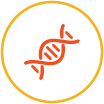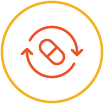Corigen® Prescription Drug Compatibility Testing
DNA Genetic Testing for Medication SafetyFind out which medications are safe or effective for you

Changing Medication Safety
What is a Prescription Drug Compatibility Test and Why Do I Need One?
The Corigen® Prescription Drug Compatibility Test uses pharmacogenomics to analyze an individual’s genetics to provide personalized insight on medications that are likely to be ineffective or harmful to them based on their unique DNA. This genetic testing for medication helps people advocate for their health and enables prescribing providers to minimize unwanted and potentially dangerous side effects from medications.
Pharmacogenomics testing is designed for people of all ages. There is clear value for adults who:
- Are prescribed medications as they age.
- Undergo medical procedures.
- Deal with a variety of physical and mental health conditions.
Children benefit from the pharmacogenomics test results by using it to steer their medical care throughout their lives.
How Does Pharmacogenomics Testing Work?
Using a saliva sample, cutting-edge genetic science, and advanced healthcare technology, DNA genetic testing for medication safety analyzes thousands of possible gene-drug interactions. A report then details clinically relevant insight, to be used by a healthcare provider, on which medications individuals should avoid or seek alternatives for, now and throughout their lives. Pharmacogenomics test results enable people and their doctors to focus on safer, more effective treatment plans – flipping the script on traditional trial-and-error prescribing.
The Cost of Getting it Wrong
- Prescription drug spending has exceeded $300 billion a year since 2015.
- Adverse drug events account for nearly 700,000 emergency department visits and 100,000 hospitalizations each year.
- Medication errors occur in 3.8 million inpatient admissions and 3.3 million outpatient visits each year.
- There are 275,689 deaths a year attributable to medication errors.
Benefits of DNA Genetic Testing for Medication

Get personalized insight on medications that can be ineffective or harmful to you based on your DNA.

Pharmacogenomics testing analyzes thousands of possible gene-drug interactions.

Get clinically relevant insight on which medications individuals should avoid or seek alternatives for.

Know which medications you should avoid currently and for the rest of your life.

Have your simple pharmacogenomics test results in one to two pages – unlike others with 50+ pages.

You and your doctor can define safer, more effective treatment plans.
Testimonials

“I was pleased to participate through my company. It so happens that I was about two weeks away from having surgery. This program was extremely helpful in identifying a pain med that would work for me as I do not metabolize Oxycodone very well. Instead of spending time in pain while my doctors tried to find an effective pain med, I simply informed them from the start that Oxycodone would not work for me. My post-surgery stay in the hospital was made much more comfortable from knowing this information!”

“Knowing the medications that will work for me in the future is huge. Just because I am fairly healthy right now doesn’t mean that can’t change in the future. Knowing the medications that work for me and the ones that don’t give me peace of mind that if anything were to happen with my health, I am prepared.”

“As a parent of a young child with ADHD and other complex medical conditions, my spouse and I have been contemplating whether or not it’s time to consider medications to help manage his ADHD. We knew the ‘trial and error’ prescribing that is often associated with ADHD can be a lot on children, parents, and other caregivers. That’s where this new medication safety program has essentially provided us with a roadmap of medications that may be safer and more effective for him. Beyond assisting us with our current need, the Medication Compatibility Report will be an extremely useful resource for us and his providers in the future.”